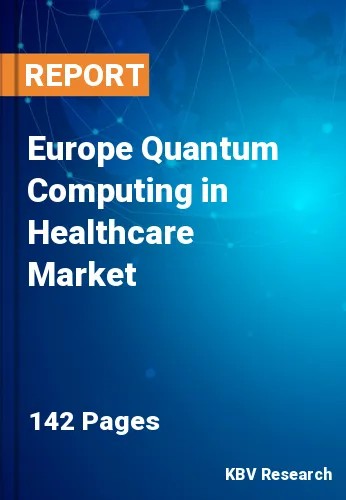The Europe Quantum Computing in Healthcare Market would witness market growth of 46.1% CAGR during the forecast period (2023-2030).
QC in the healthcare sector has expanded dramatically as a result of the growing demand for it across all healthcare sectors. The market is growing as a result of innovations in healthcare research and medication discovery, big data analytics and precision medicine, the collaboration between quantum computing and healthcare stakeholders, and government and private sector funding, among other things.
Quantum computing may also enhance medical imaging operations, enabling more accurate and rapid diagnosis by accelerating image resolution and processing speed. Due to its ability to process complex computations and handle vast volumes of data, quantum computing creates new possibilities for personalized medicine by enabling the analysis of patient-specific data and the development of tailored treatment suggestions. Although it is still in its early stages, quantum computing has the potential to have an enormous influence on the healthcare industry. The way healthcare is delivered is expected to change as technology advances, leading to greater patient outcomes, more precise tests, and more efficient therapies. The field of quantum computing has advanced significantly, moving from research to commercialization in a few niche markets.
The UK Quantum National Strategy intends to promote quantum applications to enhance everyone's quality of life in the UK, from enhancing healthcare and accelerating drug discovery to encouraging economic growth, security, and job creation, as well as combating climate change. By 2033, the UK will have a leading economy enabled by quantum technology, with quantum technologies playing a key role in developing the nation's digital infrastructure. The UK is investing $3.1 billion in quantum over the next ten years, more than doubling its previous investment, to attract extra considerable private investment ($1.2 billion). Hence, in the coming years, the regional governments' support will propel the expansion of the market.
The Germany market dominated the Europe Quantum Computing in Healthcare Market by Country in 2022, and would continue to be a dominant market till 2030; thereby, achieving a market value of $60,329.1 Thousands by 2030. The UK market is experiencing a CAGR of 44.9% during (2023 - 2030). Additionally, The France market would witness a CAGR of 47.2% during (2023 - 2030).
Based on Deployment, the market is segmented into On-premise, and Cloud. Based on Component, the market is segmented into Hardware, Software, and Services. Based on Technology, the market is segmented into Superconducting Qubits, Trapped Ions, Quantum Annealing, and Others. Based on Application, the market is segmented into Drug Discovery & Development, Medical Diagnostics, Genomics & Precision Medicine, Radiotherapy, Risk Analysis, and Others. Based on End User, the market is segmented into Pharmaceutical & Biopharmaceutical Companies, Labs & Research Institutes, Healthcare Providers, and Healthcare Payers. Based on countries, the market is segmented into Germany, UK, France, Russia, Spain, Italy, and Rest of Europe.
Free Valuable Insights: The Worldwide Quantum Computing in Healthcare Market is Projected to reach USD 1 Billion by 2030, at a CAGR of 45.4%
The market research report covers the analysis of key stake holders of the market. Key companies profiled in the report include IBM Corporation, RIGETTI COMPUTING, INC., ID Quantique SA, D-Wave Systems Inc., Google LLC (Alphabet Inc.), Protiviti Inc. (ROBERT HALF INTERNATIONAL INC.), Deloitte Touche Tohmatsu Limited, Accenture PLC and Atos Group.
By Deployment
By Component
By Technology
By Application
By End User
By Country
Our team of dedicated experts can provide you with attractive expansion opportunities for your business.

